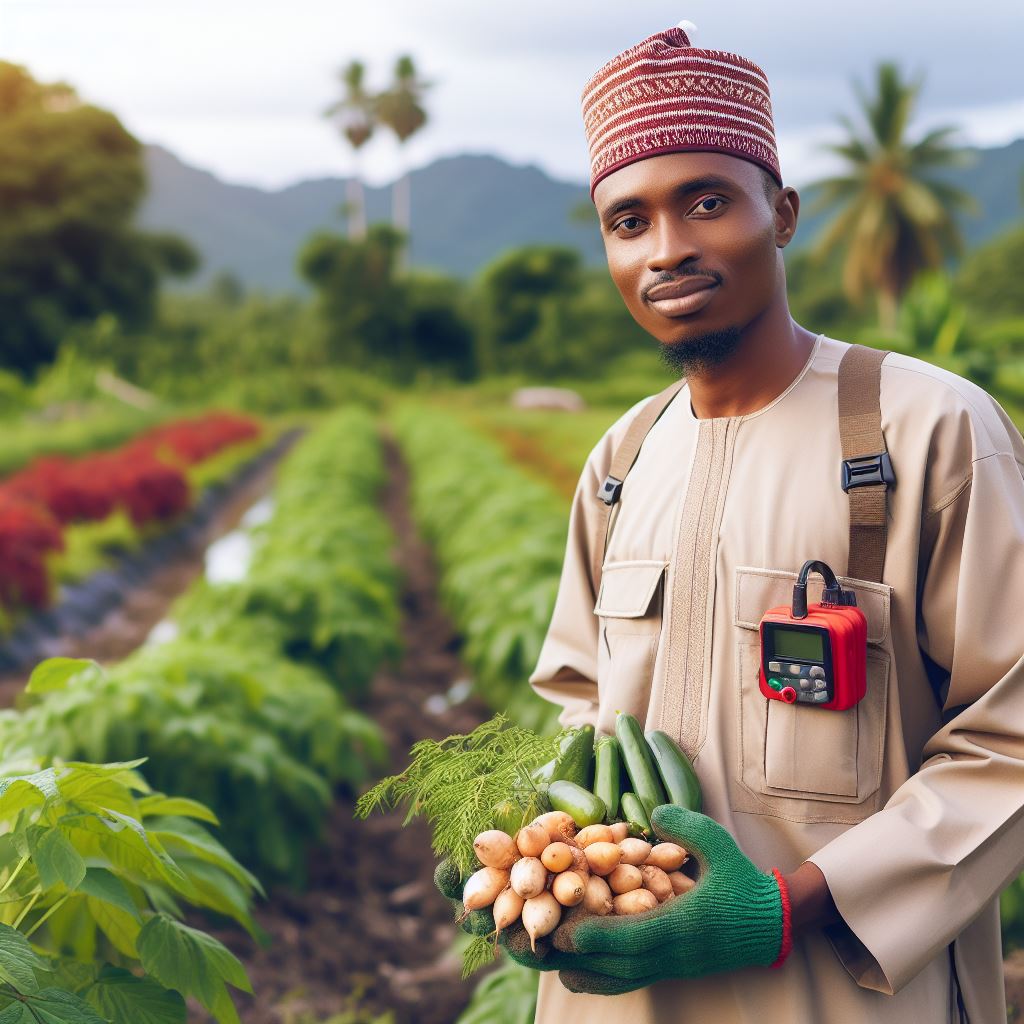Introduction
Sustainable farming practices play a vital role in enhancing agricultural production while preserving the environment.
Implementing such practices ensures the long-term viability of the agricultural sector in Nigeria.
One of the key reasons why sustainable farming practices are important in Nigeria is the preservation of natural resources.
With a rapidly growing population, there is increased pressure on land, water, and other resources.
By adopting sustainable farming practices, farmers can minimize the depletion of these resources and ensure their availability for future generations.
Additionally, sustainable farming practices contribute to food security and livelihoods.
They help maintain soil fertility, reduce soil erosion, and enhance crop productivity.
By practicing techniques such as crop rotation, organic farming, and agroforestry, farmers can optimize yields, improve nutrition, and reduce dependency on costly chemical inputs.
Sustainable farming practices promote environmental conservation.
They minimize the use of synthetic chemicals, which can contaminate water sources and harm ecosystems.
By utilizing organic fertilizers and biological pest control measures, farmers can mitigate the negative impacts of agriculture on biodiversity and ecosystem services.
In essence, sustainable farming practices are crucial for Nigeria’s agricultural sector.
They ensure resource conservation, enhance food security, and contribute to environmental sustainability.
Government agencies and farmers need to collaborate closely to promote and implement these practices for a sustainable future.
Overview of Agriculture Administration in Nigeria
Definition and role of agriculture administration
Agriculture administration refers to the management and supervision of agricultural activities, policies, and initiatives.
It plays a vital role in ensuring the effective implementation of sustainable farming practices and the overall growth and development of the agricultural sector.
Key government agencies and bodies involved in agricultural administration
Ministry of Agriculture and Rural Development
As the main governing body, the Ministry of Agriculture and Rural Development is responsible for formulating and implementing policies, programs, and regulations related to agriculture administration.
It plays a crucial role in providing strategic direction and coordinating initiatives in the agricultural sector.
National Agricultural Extension and Research Liaison Services (NAERLS)
NAERLS serves as the bridge between researchers, farmers, and other stakeholders in the agriculture sector.
It facilitates the dissemination of research findings and adoption of innovative farming practices.
They also provide training, advisory services, and technical support to farmers.
Agricultural Development Programs (ADPs)
ADPs are state-level agencies focused on agricultural development.
They play a significant role in resource allocation, infrastructure development, capacity building, and the implementation of agricultural policies and programs at the grassroots level.
Challenges and limitations in the current agricultural administration system
Inadequate funding
One of the major challenges in agricultural administration is the insufficient allocation of funds.
Limited financial resources hinder the implementation of sustainable farming practices, infrastructure development, and capacity-building programs.
Lack of coordination
There is often a lack of proper coordination between different government agencies and bodies involved in agriculture administration.
This leads to duplication of efforts, inefficiencies, and ineffective implementation of policies and programs.
Limited access to technology and information
Many farmers lack access to modern technologies and information required to adopt sustainable farming practices.
This hampers their productivity and limits the overall growth of the agricultural sector.
Inefficient extension services
The extension services provided to farmers are often inadequate and not tailored to their specific needs.
Limited access to training, advisory services, and technical support hinders the adoption of sustainable farming practices.
Weak infrastructure
The poor state of rural infrastructure, such as roads, irrigation systems, and storage facilities, hampers the efficient distribution of agricultural inputs, produce, and market access.
This negatively impacts the overall productivity and profitability of farmers.
Climate change and environmental degradation
The agricultural sector is vulnerable to climate change and environmental degradation.
Extreme weather events, soil erosion, and water scarcity pose significant challenges to sustainable farming practices and agricultural productivity.
In fact, agriculture administration in Nigeria plays a crucial role in promoting sustainable farming practices and ensuring the overall growth of the agricultural sector.
However, challenges such as inadequate funding, lack of coordination, limited access to technology and information, inefficient extension services, weak infrastructure, and climate change pose significant limitations to its effectiveness.
Addressing these challenges requires a coordinated effort from the government, farmers, researchers, and other stakeholders to ensure a more sustainable and prosperous agricultural sector in Nigeria.
Read: Key Modules in Nigeria’s Agribusiness Degree Programs
Sustainable Farming Practices in Nigeria
Definition and Importance of Sustainable Farming Practices
Sustainable farming practices refer to methods and techniques that promote agricultural productivity while minimizing environmental impact and preserving natural resources.
Transform Your Career with Expert Guidance
Get personalized mentorship consulting that’s tailored to your unique path. Our expert advice is actionable and exclusive.
Get StartedThese practices aim to maintain the long-term health and fertility of farmland and ensure the sustainability of food production for future generations.
In Nigeria, sustainable farming practices play a crucial role in addressing various agricultural challenges and achieving food security.
With a growing population and limited arable land, it is essential to adopt sustainable practices to maximize agricultural productivity without compromising the environment.
Examples of Sustainable Farming Practices in Nigeria
Conservation Agriculture
Conservation agriculture involves minimal soil disturbance, permanent soil cover, and crop rotation, ensuring soil health and preventing erosion.
Farmers in Nigeria have started implementing this practice, which helps to retain water, improve soil fertility, and reduce the need for chemical inputs.
Agroforestry
Agroforestry combines the cultivation of trees with agricultural crops.
It helps to improve soil fertility through nutrient cycling, provides shade and windbreaks, conserves water, and offers additional sources of income through the sale of timber and non-timber forest products.
Organic Farming
Organic farming avoids synthetic fertilizers, pesticides, and genetically modified organisms.
Instead, it focuses on natural processes and inputs, such as composting, biological pest control, and crop rotation.
Organic farming promotes biodiversity, protects soil health, and provides healthier food options for consumers.
Benefits and Advantages of Adopting Sustainable Farming Practices
Environmental Conservation
By adopting sustainable farming practices, farmers in Nigeria can protect the environment by reducing soil erosion, preserving water quality, and enhancing biodiversity.
This conservation effort contributes to a healthier ecosystem and helps mitigate climate change.
Increased Productivity and Profitability
Sustainable farming practices can lead to increased crop yields and improved farm profitability.
Practices such as organic farming and conservation agriculture enhance soil fertility and reduce input costs, leading to higher returns on investment for farmers.
Food Security
With the growing population in Nigeria, sustainable farming practices are crucial for ensuring food security.
By preserving soil health, conserving water resources, and minimizing the use of harmful chemicals, these practices contribute to a more sustainable and resilient agricultural system, capable of meeting the country’s food demands.
Healthier Food and Enhanced Nutrition
Sustainable farming practices, such as organic farming, produce healthier food options that are free from harmful chemicals and genetically modified organisms.
These practices also promote crop diversity, leading to a more varied diet and enhanced nutrition for consumers.
Rural Development and Poverty Alleviation
Adopting sustainable farming practices can contribute to rural development by creating employment opportunities, improving infrastructure, and enhancing the socioeconomic well-being of farming communities.
These practices also reduce farmers’ dependency on expensive inputs, thus alleviating poverty.
In short, sustainable farming practices have become imperative for Nigeria to address its agricultural challenges, achieve food security, and protect the environment.
The adoption of practices such as conservation agriculture, agroforestry, and organic farming can lead to numerous benefits, including increased productivity, environmental conservation, food security, improved nutrition, and rural development.
It is essential for policymakers, farmers, and stakeholders to promote and support these practices to create a sustainable future for Nigerian agriculture.
Read: Benefits of Studying Agricultural Business in Nigeria

The Interplay between Agri-Admin and Sustainable Farming Practices
Understanding the relationship between agricultural administration and sustainable farming
- Effective agricultural administration is crucial for the successful implementation of sustainable farming practices.
- Agri-admin provides the necessary framework and policies to support sustainable farming methods.
- Sustainable farming practices aim to minimize negative environmental impacts while maximizing productivity and profitability.
- Agri-admin plays a key role in promoting sustainable farming by regulating and monitoring agricultural activities.
- The relationship between agri-admin and sustainable farming is symbiotic and mutually beneficial.
- Agri-admin ensures that sustainable farming practices adhere to local laws, regulations, and quality standards.
- Sustainable farming practices, in turn, contribute to the development and growth of the agricultural sector.
- Through effective agri-admin, sustainable farming practices can be scaled up and replicated across different regions.
- Understanding the interdependence between agri-admin and sustainable farming is crucial for agricultural development.
- The collaboration between agri-admin and farmers is vital to achieve sustainable and resilient food systems.
Ways in which agriculture administration can support and promote sustainable farming practices
- Policy formulation: Agri-admin can create policies that incentivize the adoption of sustainable farming practices.
- Capacity building: Providing training and education programs to farmers on sustainable farming methods.
- Financial support: Offering financial incentives and loans to farmers who engage in sustainable farming.
- Research and innovation: Supporting research initiatives that focus on sustainable farming technologies and techniques.
- Extension services: Agri-admin can provide extension services to farmers, sharing sustainable farming best practices.
- Market access: Facilitating market linkages for farmers practicing sustainable farming to ensure fair trade and better prices.
- Monitoring and enforcement: Ensuring compliance with sustainable farming regulations through monitoring and enforcement mechanisms.
- Information dissemination: Disseminating information about sustainable farming practices through various channels.
- Partnerships and collaborations: Engaging in partnerships with stakeholders to promote sustainable farming practices.
- Policy advocacy: Representing the interests of sustainable farmers and advocating for supportive policies and regulations.
Examples of successful integration of agri-admin and sustainable farming practices in Nigeria
- The Nigeria Incentive-Based Risk Sharing System for Agricultural Lending (NIRSAL) promotes sustainable farming through financial support and risk management.
- The Growth Enhancement Support Scheme (GESS) provides subsidized inputs and training to farmers, encouraging sustainable practices.
- The National Agricultural Extension and Research Liaison Services (NAERLS) disseminate information on sustainable farming to farmers across Nigeria.
- The Presidential Fertilizer Initiative boosts sustainable farming by enabling farmers to access affordable and high-quality fertilizers.
- The National Agency for Food and Drug Administration and Control (NAFDAC) ensures the use of safe and sustainable farming practices in food production.
- The Agricultural Fresh Produce Growers and Exporters Association of Nigeria (AFGEAN) promotes sustainable farming for export-oriented agriculture.
- The Climate Smart Agriculture Program encourages farmers to adopt climate-resilient and environmentally sustainable farming practices.
- The implementation of the E-wallet system enhances transparency and efficiency in the distribution of subsidized agricultural inputs.
- The Green Alternative Initiative focuses on sustainable farming practices, including organic farming and conservation agriculture.
- The establishment of Farmers’ Cooperatives facilitates knowledge sharing and collective implementation of sustainable farming practices.
Read: How Agricultural Economics Shapes Nigeria’s Farm Policies
Challenges and Opportunities
Challenges faced in implementing sustainable farming practices due to inadequate agri-admin support
- Inadequate funding hampers research and development of innovative sustainable farming practices.
- Lack of government policies and regulations that support and incentivize sustainable farming practices.
- Insufficient training and education programs for farmers to learn about sustainable farming techniques.
- Resistance to change and reluctance to adopt new sustainable farming methods by traditional farmers.
- Limited access to markets and distribution networks for sustainable agricultural products.
Opportunities for improving the interplay between agri-admin and sustainable farming practices
- Increasing awareness and education about the benefits of sustainable farming practices for both farmers and consumers.
- Establishing collaborations and partnerships between agri-admin and sustainable farming organizations.
- Creating economic incentives and subsidies for farmers who adopt sustainable farming methods.
- Investing in research and development to improve and optimize sustainable farming techniques.
- Expanding access to markets and creating demand for sustainable agricultural products.
Potential solutions and strategies to address the challenges and maximize opportunities
- Allocate more funding and resources to support research and development in sustainable farming practices.
- Strengthen government policies and regulations to promote and enforce sustainable agriculture.
- Offer comprehensive training programs and workshops for farmers to learn about sustainable farming techniques.
- Encourage knowledge-sharing and mentorship programs to facilitate the adoption of sustainable farming practices.
- Develop and implement certification systems to verify and promote sustainable agricultural products.
- Establish partnerships between farmers and businesses to improve market access for sustainable agricultural products.
- Provide financial incentives, such as tax breaks or grants, to encourage farmers to transition to sustainable farming.
- Support and invest in advanced agricultural technologies that can enhance sustainability and productivity.
- Promote consumer education and awareness about the importance of supporting sustainable farming practices.
- Create platforms for dialogue and collaboration between agri-admin, farmers, and sustainable farming organizations.
By overcoming the challenges and capitalizing on the opportunities, the interplay between agri-admin and sustainable farming practices can be strengthened.
This will not only benefit the environment but also ensure the long-term viability and profitability of the agricultural sector.
It requires a collective effort from all stakeholders to create a sustainable future for agriculture.
Read: Internships and Work Experience for Agribusiness Students in Nigeria
Conclusion
Recap of the Interplay between Agri-Admin and Sustainable Farming
Administering agriculture shapes sustainable practices, ensuring eco-friendly methods preserve Nigeria’s agricultural legacy.
Government involvement, through policies and regulations, establishes frameworks promoting environmentally conscious farming approaches.
Farmers implementing sustainable practices—crop rotation, organic fertilizers—enhance soil fertility, ensuring long-term productivity.
The interdependence between administrative support and sustainable methods cultivates resilience against environmental challenges.
Efficient water management, reduced chemical usage, and biodiversity conservation stand pivotal in sustainable farming initiatives.
Call to Action for Collaborative Prioritization of Sustainable Farming
Stakeholders, from policymakers to farmers, must unify efforts, prioritize sustainable farming, and adopt eco-friendly techniques.
Collaboration between agricultural administration and local farming communities fosters knowledge exchange for sustainable methodologies.
Investment in research and education equips farmers with innovative, sustainable practices, ensuring food security and environmental preservation.
Awareness campaigns and workshops can enlighten stakeholders about the benefits and urgency of embracing sustainable farming practices.
Implementing incentives, subsidies, and grants can encourage farmers to transition to sustainable methods, promoting a greener agricultural landscape.
The nexus between agricultural administration and sustainable farming is paramount for Nigeria’s future.
Collaboration, education, and incentives are the linchpins to usher in a new era of environmentally friendly agriculture.
It’s time for concerted action to safeguard our land, ensure food security, and preserve our natural resources for future generations.




